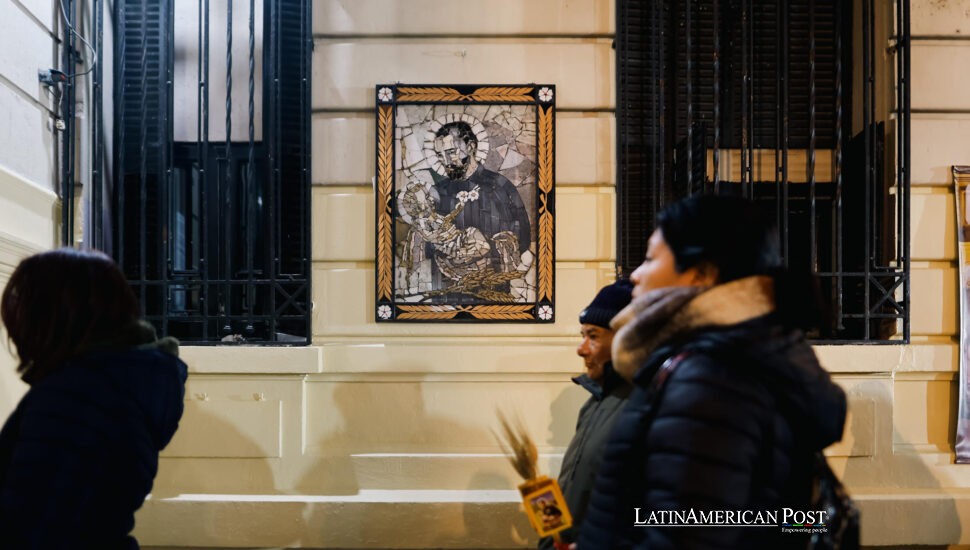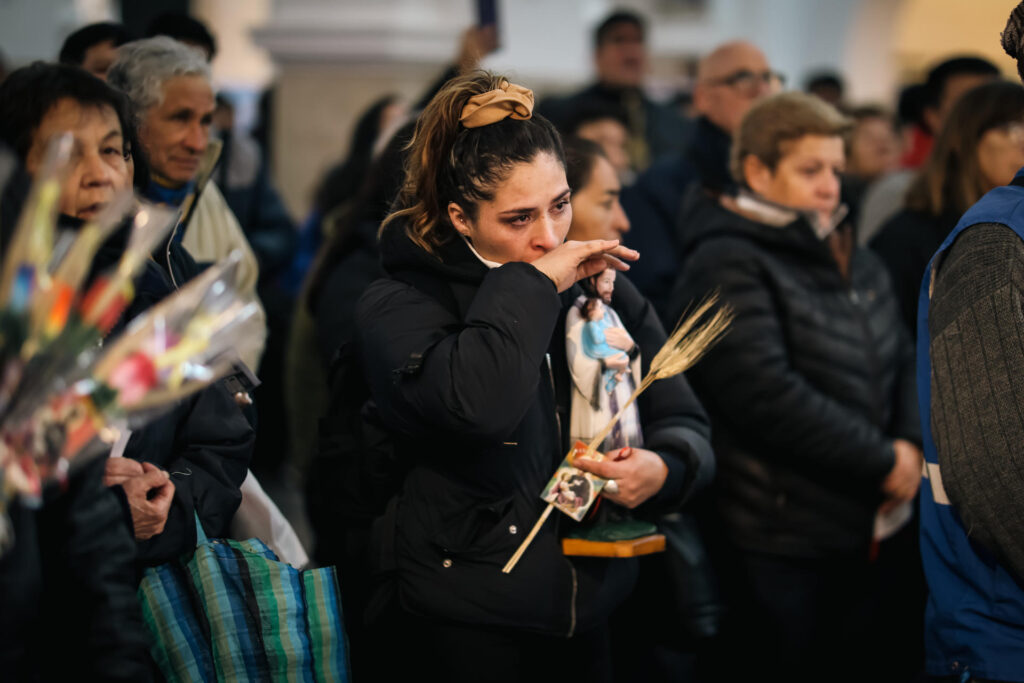Argentina Turns to San Cayetano as Milei’s Austerity Bites Into the Promise of Work

In Buenos Aires, the winter line for San Cayetano stretched for blocks—faithful hands clutching statues, rosaries, and hope. They came to pray for jobs and stability, but their chants carried a sharper plea: an end to President Javier Milei’s economic squeeze.
Faith in the Cold Morning
Before the first pale light reached the rooftops, the line outside San Cayetano parish in the working-class neighborhood of Liniers was already winding around corners. Steam rose from paper cups of mate, and whispered prayers punctuated the slow shuffle toward the church doors.
In the middle of the crowd stood Lorenza Medina, her arms wrapped around a nearly one-meter-tall statue of San Cayetano, its wooden face lit by the glow of candles inside the parish. “I’ve had him at home for twenty years,” she told EFE, describing the little shrine she keeps in her bedroom. Every August 7, she renews the ritual—this time not for herself, but for others. “Thanks to him, to God, and to the Virgin, I’ve never lacked work. But I came to ask for those who do.”
A few steps away, Marco Antonio Chacón leaned over his stall of rosaries, medals, and prayer cards, the small lightbulb swinging above him casting long shadows in the cold. He admitted sales were slow. “It’s not like other years. People seem to be losing faith,” he said, using the Argentine slang laburo for work. Chacón, like millions surviving in the informal economy, has seen lean times before, but clings to the saint’s reputation. “Sixteen years he’s given me health and work. You can’t lose faith—you have to keep rowing.”
Blessings and Demands
Inside the parish, the pews filled with those clutching flowers or photos of loved ones in need of work. Outside, the crowd grew louder—not just with hymns, but with slogans and demands.
The Day of San Cayetano has always been a blend of devotion and labor activism. This year, the tone was sharper. Rodolfo Aguiar, secretary of the Asociación de Trabajadores del Estado (ATE), didn’t mince words. “We workers come to this march poorer, more indebted, and in worse health than last year,” he told EFE. He accused Milei’s government of “collecting dollars only to pay the IMF,” warning that such priorities “lead directly to tragedy.” His call was clear: let this march be the opening act for a general strike.
Statistics give his anger weight. The Central de Trabajadores de Argentina (CTA) reports more than 183,000 jobs lost since Milei took office in December 2023. The proportion of Argentines making their living without contracts, benefits, or pension contributions has surged, pulling more households into the shadows of the economy.
A Church in the Streets
Before the march set off toward Plaza de Mayo, Archbishop Jorge García Cuerva, the head of the Argentine Catholic Church, stepped off the parish steps and onto the wet asphalt. He blessed workers’ tools—worn hammers, sewing machines, even a mason’s trowel—and then extended the blessing to the people themselves. “Here we bless the lives of every Argentine,” he said, “our people who need work as the great social organizer.”
Around him, the symbols of both worship and resistance mingled. Parishioners carried statues of the Virgin Mary, while women from community kitchens hoisted giant soup pots as if they were sacred relics. Each object told a story: faith in divine help, and a protest against the hunger creeping into their neighborhoods.
In the crowd, Alejandro Gramajo, secretary general of the Unión de Trabajadores de la Economía Popular, echoed the archbishop’s sentiment but with a political edge. The blessing Argentina needed most, he argued, was “a dignified, just, livable life—with peace, land, housing, and work for all.” These, he said, were “sacred, universal rights that every government should guarantee.” Instead, he accused Milei’s austerity of “generating hunger, misery, poverty, and debt.”

Faith, Work, and Resistance
San Cayetano’s feast has long been more than a religious observance—it’s a mirror of Argentina’s social mood. In years of economic calm, the day carries an air of gratitude; in years of crisis, it becomes a platform for demands. This August 7 was firmly the latter.
As the faithful and the frustrated moved together toward the city center, they carried their beliefs on their shoulders—sometimes in the form of a saint’s likeness, in a steel pot meant to feed the hungry. Unions marched alongside informal workers, churchgoers beside activists, their paths converging in the call for work that is stable, fair, and human.
Milei’s sweeping cuts and market-shock policies have been praised by some investors but felt like an iron grip to many on the streets. The prayers spilling from San Cayetano’s doors were for more than individual jobs—they were for the survival of Argentina’s working class.
Also Read: Chile’s Lithium Crossroads: Politics, Profit, and the Price of Power in the Atacama
By the time the procession reached Plaza de Mayo, the air was thick with incense, steam from the soup pots, and chants that blended liturgy with protest. In the eyes of those carrying statues and banners alike, there was the same steady determination: faith may be personal, but in Argentina’s streets, it is also political.
Quotes and interviews courtesy of EFE.





